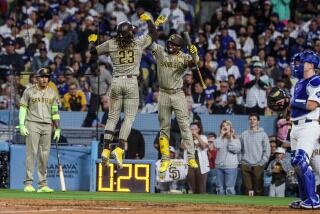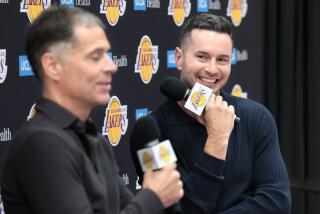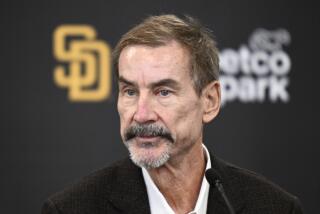PADRES ’91 A SEASON OF TRANSITION : PUTTING HIS PLANS INTO PLAY : The Padres Have Given Greg Riddoch the Opportunity to Put His Ideas to the Test in the Major Leagues. Getting Those Involved to Accept Them, However, Is a Different Matter
SAN DIEGO — Padre Manager Greg Riddoch starts to speak, abruptly stops, and slams his eyelids shut. He keeps waiting for the sensation to pass. Ten seconds. Twenty seconds. Half a minute. It’s no use. The tears start to flow.
Riddoch excuses himself, walks to the bathroom and pulls out a wad of tissue. He dabs his eyes. Blows his nose. And returns, embarrassed that he has unveiled his emotions.
His eyes are red and misty. He clumsily begins to talk again, his lower lip slightly trembling.
“Sometimes,” he says, “I ask myself, ‘Why me?’
“Why do I get to be a major league manager?
“Why do I get to have such a great wife and fine family?
“Why do I get to be so blessed?”
Now I lay me down to sleep.
He sniffs, wipes his eyes and thinks back to those days growing up in Orange County. Those were the ugly days he wasn’t sure if he wanted to live.
The hatred between himself and his stepfather became so intense, so violent, that twice he contemplated suicide.
Once, at 14, he was in a friend’s house and noticed a gun. He didn’t say anything to his friend, but he kept looking at the gun, envisioning himself walking over, pointing it toward his temple, and pulling the trigger.
I pray the Lord my soul to keep.
It was two years later when Riddoch found himself in another nasty argument with his stepfather. This time, his mother tried to intervene. The next thing Riddoch knew, his mother was being shoved to the ground. Riddoch couldn’t stop himself and punched his stepfather. The favor was returned, with Riddoch being slammed against the front door.
He reached up, opened the door and ran away. He wasn’t coming back. In a few days, he didn’t even want to live.
If I should die before I wake.
Riddoch stood in front of a mirror in his girlfriend’s house. He had sleeping pills in one hand and a glass of water in the other. He was going to swallow the pills, lie down and never wake up.
“It was going to be simple and easy,” he said.
But just as he did not pick up the gun, he did not swallow the pills. He decided life was worth living. Never again has suicide been an alternative to escape reality.
“It happened so long ago,” Riddoch said, “but I still think about it. It’s so hard to suppress, but that’s what I have to do . . .
“I don’t know, I guess I still have trouble dealing with the memories.”
I pray the Lord my soul to take.
Riddoch, 45, often recalled those times during the last three months of the 1990 season. It was a period of absolute misery. He had the opportunity of a lifetime. He was managing for the first time since Eugene, Ore., in 1981, and he wished he never had accepted the offer.
He never wanted to manage again, anyway. Coaching was fine. If he grew tired of coaching, maybe he’d slip back into the front office.
But managing? Nah. He gave that up 10 years ago in the Northwest League.
When Padre chairman Tom Werner and owner Russell Goldsmith summoned Riddoch to Los Angeles during the All-Star break, Riddoch said thanks, but no thanks. He was not interested in managing. He took a flight back home to Greeley, Colo., and was just starting to relax again when Werner called again. They really wanted and needed him--now.
Riddoch reluctantly agreed and, after a 1-11 start, wondered why. What a mess. The team was playing horribly. The clubhouse was mayhem. People he considered friends had turned their backs on him.
“I was thoroughly embarrassed by what happened,” Riddoch said. “I couldn’t wait for the season to end. It seemed like one crisis after another.”
The first calamity came July 11, the day Riddoch was named manager. Pat Dobson, Padre pitching coach and Riddoch’s best friend on the staff, had wanted the job and didn’t try to hide his disappointment. Just before Riddoch’s first game, Dobson quit. Riddoch’s pleading prompted Dobson to agree to return the next night.
It was just the beginning. The clubhouse was in turmoil. Jack Clark was ripping management. Jack Clark was ripping Tony Gwynn. Gwynn was ripping those who were ripping him. Jack McKeon, general manager, was being fired.
The only peace Riddoch found came during games.
“I was absolutely miserable,” said Riddoch, who had a 37-43 record as manager. “I couldn’t even think straight.
“It was like a runaway train. You just try to steer it until it reaches the end of the track, but there was no way I could stop it.”
Said Gwynn: “He never had a chance. It was chaos, total chaos. You could see how it was affecting him. You could see it in his face. But by that point, there was nothing anyone could do.”
The day after the season ended, Riddoch took the first available flight to Greeley in search of solitude. Uh-uh. The front-office was dismantled. The coaching staff was overhauled. Nobody was safe.
Soon whispers grew louder. Riddoch was accused of being behind the firings. He was the one who planted the seeds, his detractors alleged.
One Padre secretary, so upset when her administrator was fired, called Riddoch, yelling and crying. Coaches were indignant at the late notice of their firings, knowing that it was too late to find other jobs. Everyone started pointing at Riddoch.
Riddoch, naturally, provided his insight into several personnel matters. In other cases, he did not know who these people were, let alone make recommendations. But when the names started tumbling, Riddoch was the easy target. No one defended him.
Of all the verbal attacks, the worst came in December. Jack Clark belittled him in print, assaulting his managerial abilities and character. Now everyone in baseball wondered about Riddoch.
It’s also when the rumors started, and they have not stopped. Because Riddoch already was hired when Joe McIlvaine became general manager, how long was the manager going to get? Why was Riddoch the last to know about these trades? Just how long before Jim Riggleman, the Padres’ triple-A manager, takes over?
“Hey, he’s our manager,” McIlvaine said, “and we’re going to give him every opportunity to succeed. It’s something we’ll evaluate all year. We’re going to give him every chance in the world.
“I want him to succeed, I really do. I want him to be the best manager in baseball.”
Riddoch, with a one-year, $160,000 contract, knows he is in a precarious position. He knows everyone will be watching every move.
There also is a feeling of comfort, for Riddoch has a secret clause in his contract.
Riddoch can’t get fired this season. He can be removed as manager, but he must remain on the coaching staff for the season.
There’s a stipulation built into his contract, according to a front-office source, that assures his employment this season. This was done to provide Riddoch with a full year on the major league pension program, giving him five years of service, and raising him to the better-paying bracket of the pension plan.
Riddoch wouldn’t comment, but confirmed that there’s a unique clause in his contract.
“I’m not threatened by anything,” he said, “and a lot of that is because the way Tom Werner made me feel. I’ll do as good as I can until Mr. Werner and the rest of the owners tell me it’s time to move on.
“But I’m not locked into this. I can do other things. It’s not like, ‘Do a good job or else.’ I can always go back into (baseball) administration. Tom Werner and the rest of the owners have let me know that I’ll be here, one way or the other.”
Yet, Riddoch’s friends say he desperately wants to succeed. He never has been a failure, and he’s not about to start. He wants to show everyone his style of managing works, and he’ll fight to the end trying to prove it.
“I know I’m different,” he says, “but I am what I am, and I’m not ashamed of what I am.”
Perhaps it’s his sensitivity, actually feeling hurt when criticized by players, that sets Riddoch apart. Or perhaps it’s his background, considering that the last time he managed a team at the start of a season was the Reds’ rookie league team in Eugene. Or maybe it’s paranoia, as his critics allege.
Since the outset of camp, Riddoch has behaved more like a camp counselor than your usual manager. There have been team dinners. There has been a pool tournament. He has roamed the clubhouse, having heart-to-heart conversations.
He has done everything possible this spring to get the Padres to conduct themselves like a team again. The drills have been conducted on one field, to ensure everyone is together. Each morning’s calisthenics have been done together. Social events are available most evenings.
All for one, and one for all, right?
“I can’t believe the rah-rah stuff that’s going on around here,” one veteran said. “It’s like they’re throwing that stuff in our face every day. It’s OK, for the young guys, but come on, not for guys like myself. We don’t need to hear that.”
Further, the players have been instructed how to behave when talking to reporters. No longer will there be sniping in the press. No longer will a player read about what another is thinking of him. If you’ve got a problem, Riddoch has said, straighten it out among yourselves. There even was a mandate against criticizing the training site in Yuma, Ariz.
“I happen to believe that if you create the right atmosphere and team unity,”’ Riddoch said, “you have a much better chance of winning. This is a team game played by individuals. You have to pull for another, and dedicate yourself to the team concept.
“I think that’s needed now more than ever.”
Reporters also better play by these rules. Riddoch won’t tolerate negative coverage. He already has pulled aside the beat writers this spring to warn that critical stories do not have a place in his locale.
You want trouble? Go ahead and quote a player who is critical of the team. The following morning, the same player will be in the manager’s office explaining himself.
“If I see something negative in a paper or when I see something that is destructive,” Riddoch said, “I’ll sit down and talk to them about it. I believe there are certain things we talk about in here that are nobody’s business.
“We don’t talk about your family or your private arguments, so why should ours be common knowledge?”
Yes sir, everything’s going to be positive. You want someone to ridicule the players? You’ve got the wrong guy. You want someone to blast the front office? Mum’s the word.
“I can’t constantly belittle my players and hope to get something back for it,” Riddoch said. “I’m not going to destroy anyone. I’m not going to chastise anyone, because I need him and he needs me.
“That’s me, and you should accept me for that.”
Riddoch now realizes his relationships with players change once he steps into the manager’s office. No longer can he be best friends with his players. Close friendships, such as those with Mark Davis (now in Kansas City) and Eric Davis of the Reds, likely will be impossible to start as a manager. That’s the rotten aspect of his job.
“Ever since I’ve known him,” said Padre bench coach Jim Snyder, who managed Riddoch in the minors, “he’s been like that. He’s always been sensitive to the needs of his players and will attend to that.
“That’s why it’s so important to him that a positive approach was built in spring training, and hopefully will carry over to the season.”
Riddoch scrutinizes his team daily. He sees the same flaws. The bottom half of the lineup has not developed. There are two kids in the outfield who never before have had a starting job at this level. There’s a second baseman who hasn’t played the position daily since 1986. The starting rotation consists of two veterans and three unproven pitchers. The bullpen consists of four pitchers whom Riddoch barely even knows.
And people want Riddoch to honestly assess his team’s chances of winning the National League West.
“I don’t know how we’re going to do, I really don’t,” Riddoch said. “My job is to be as prepared as we possibly can. If we play up to our ability, I can live with the results.
“If our best is fourth place, I don’t worry about it. If we finish second or third, but it’s not our best, we’re only cheating ourselves.”
Riddoch is confident, but realistic. He’s tranquil, but fidgety. He knows what this means. This is perhaps his only opportunity to prove he can be a big-league manager. If he fails, he realizes that he will not get another shot. He is preparing for the consequences.
All he’s asking for is a chance. Give him time, he pleads. Let him try his style. Don’t be so quick to judge that his method is wrong.
“There’s a lot of people out there that don’t want me to succeed,” he said. “There’s a lot of people out there who want me to fall flat on my face. That’s OK, let them think what they want.
“But I’m going to give this job everything I’ve got. I care about this team. I believe in these people, I really do.
“I just hope they believe in me.”
More to Read
Go beyond the scoreboard
Get the latest on L.A.'s teams in the daily Sports Report newsletter.
You may occasionally receive promotional content from the Los Angeles Times.










